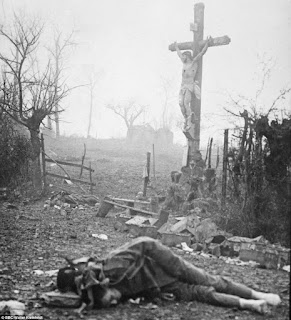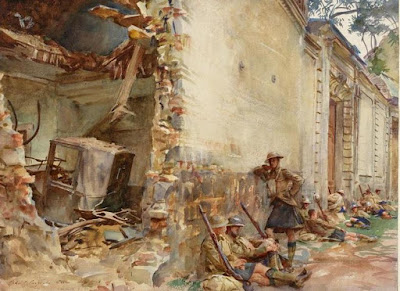 |
| TP Cameron Wilson |
After eighteen months as a soldier, in March of 1916, he wrote to his mother, “Out here you must trust yourself to a bigger Power and leave it at that. You can’t face death....There’s no facing it. It’s everywhere. You have to walk through it, and under it and over it and past it. Without the sense of God taking up the souls out of those poor torn bodies – even though they’ve died cursing Him – I think one would go mad.”
In June of 1916, he wrote the poem “The Soldier.”
“The Soldier”
He laughed. His blue eyes sought the morning,
Found the unceasing song of the lark
In a brown twinkle of wings, far out.
Great clouds, like galleons, sailed the distance.
The young spring day had slipped the cloak of dark
And stood up straight and naked with a shout.
Through the green wheat, like laughing schoolboys,
 Tumbled the yellow mustard flowers, uncheck'd.
Tumbled the yellow mustard flowers, uncheck'd.The wet earth reeked and smoked in the sun . . .
He thought of the waking farm in England.
The deep thatch of the roof — all shadow-fleck 'd —
The clank of pails at the pump . . . the day begun.
"After the war . . . " he thought. His heart beat faster
With a new love for things familiar and plain.
The Spring leaned down and whispered to him low
Of a slim, brown-throated woman he had kissed . . .
He saw, in sons that were himself again,
The only immortality that man may know.

And then a sound grew out of the morning,
And a shell came, moving a destined way,
Thin and swift and lustful, making its moan.
A moment his brave white body knew the Spring,
The next, it lay
In a red ruin of blood and guts and bone.
. . . . . . . . . . . . .
Oh ! nothing was tortured there ! Nothing could know
How death blasphemed all men and their high birth
With his obscenities. Already moved,
Within those shattered tissues, that dim force,
Which is the ancient alchemy of Earth,
Changing him to the very flowers he loved.
. . . . . . . . . . . . .
"Nothing was tortured there!" Oh, pretty thought!
When God Himself might well bow down His head
And hide His haunted eyes before the dead.
--T.P. Cameron Wilson
“He laughed” – this is a war poem that begins with a laugh, and not an ironic one. The opening lines exult in the sheer joy of a spring morning and “a new love for things familiar and plain.” Boisterous and joyful, the day is likened to a naked nature worshipper; the mustard flowers cavort like laughing schoolboys; a lark sings in the distance, and clouds move across the sky like proud sailing ships.
 The wonders of the dawn remind the soldier of early mornings enjoyed on his farm at home and dare him to hope for a time after the war, for his return to the English countryside, for a wife and sons with whom to share the future.
The wonders of the dawn remind the soldier of early mornings enjoyed on his farm at home and dare him to hope for a time after the war, for his return to the English countryside, for a wife and sons with whom to share the future. But in a moment, all is utterly changed. An enemy’s shell, its sound obscenely rising above the morning’s birdsong, transforms the brave white body into “a red ruin.” Death itself is described as blasphemous and obscene, while the “ancient alchemy of Earth” changes what is left of the young soldier’s body to “the very flowers he loved.”
Twice, the poem repeats “Nothing was tortured there” as a kind of incantation that seeks desperately to assure witnesses, survivors, loved ones at home, and perhaps God Himself that it was a quick and painless death. But it is meager comfort: even God’s eyes are haunted by the scenes of carnage and needless death that were commonplace during the First World War.
In spring of 1916, Wilson he sent a letter to a friend in England, urging, “Do teach your dear kids the horror of responsibility which rests on the war-maker. I want so much to get at children about it. We’ve been wrong in the past. We have taught schoolboys ‘war’ as a romantic subject…And everyone has grown up soaked in the poetry of war – which exists, because there is poetry in everything, but which is only a tiny part of the great dirty tragedy. All those picturesque phrases of war writers – such as ‘he flung the remnants of his Guard against the enemy,’ ‘a magnificent charge won the day and the victorious troops, etc. etc.,’ are dangerous because they show nothing of the individual horror, nothing of the fine personalities smashed suddenly into red beastliness, nothing of the sick fear that is tearing at the hearts of brave boys who ought to be laughing at home – a thing infinitely more terrible than physical agony.”
Like so many others and like the soldier of whom he wrote, T.P. Cameron Wilson did not return home from the war. He was killed on March 22, 1918 during the German Spring Offensive; his body was never found.
In the introduction to Wilson’s posthumously published book of poems, Magpies in Picardy, Harold Monro wrote that Wilson was “extremely shy about his verse, and unlike most youthful poets, was always disinclined to let it be seen, or discussed by his friends….The question whether the poems which follow are, or are not, important contributions to the literature of our time will be decided by their readers. As the expression of a personality, they are, at any rate, remarkable.”
As we commemorate the centenary of the First World War, new readers can determine for themselves the value and merits of this lost voice of the war.













